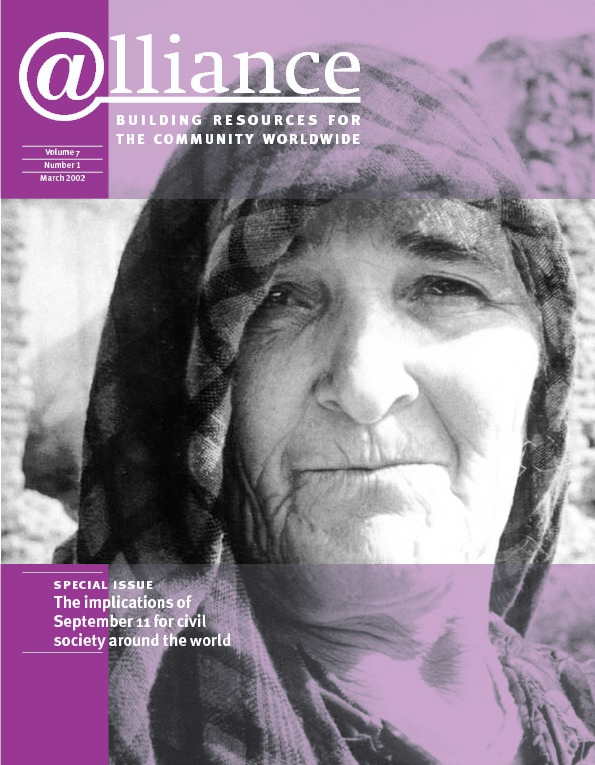Education, health services and human rights are undoubtedly the greatest needs of Afghan women at the present time. These needs can best be met by Afghan women’s NGOs. How can donors best support these NGOs and help women overcome some of the particular obstacles they face in trying to work in Afghanistan today?
The most successful programmes for Afghan women in the last decade have been started by Afghan women’s NGOs. In the absence of an effective national government – or, in the case of the refugees, any government at all – a number of these NGOs have been providing education and health services to Afghan women in refugee camps in Pakistan and Iran and to some women in Afghanistan for several years. These are grassroots organizations that have been very effective in empowering women and bringing education and health services to them. They know how to work with Afghan communities of various ethnic and religious backgrounds. They know how to work with all members of the community, particularly men, to provide essential services to women.
Finding effective NGOs to support
Some of these Afghan women’s NGOs are very effective, others are not. What does a donor need to look for when evaluating the effectiveness of a particular NGO? In Pakistan, it is important to find out if the NGO is registered with the Pakistan Commissionerate for refugees, or is a member of ACBAR or another coordinating body for Afghan relief. Both ACBAR and the Pakistan Commissionerate have criteria that NGOs have to meet before they can be registered or become a member. Thus, if an NGO has met those criteria, then some screening as to its effectiveness has already occurred.
In general, it is important to find out as much about the NGO and its programmes as
possible. Important questions to ask include the following:
- How long has the NGO been in existence?
- Who are its donors? How large are their grants? How long have the donors funded the organization?
- What programmes does the NGO offer and for how many women and children?
- How large is the staff and what areas and ethnic groups of Afghanistan do they come from?
- What plans does the NGO have for the next two years and does it have the capacity to implement the planned programmes?
If possible, a donor should visit the programmes of the Afghan NGO to see what it actually does. It is also worth checking with past donors to find out how they rate the work of that NGO.
Overcoming the obstacles women face
Afghan women working in NGOs face a number of obstacles in trying to work in Afghanistan at the present time that men do not encounter. These include the following:
- Security This is a major issue at the present time because Afghanistan is a very dangerous place. There are very few buildings to work in and rent has become extremely high, essentially putting rental of offices out of the financial range of all but foreigners, who have a lot of money. Afghan women need assistance in obtaining secure offices and in travelling.
- Transportation of vehicles, equipment and staff to Afghanistan This is very difficult for women. Many Afghan NGOs have vehicles, equipment and staff in Pakistan that could be used in Afghanistan. However, border crossings are difficult and transportation within Afghanistan is very dangerous. Although air transportation is now available, it is prohibitively expensive and only available to UN officials or those with a lot of money – foreigners again.
- Getting visas The staff of Afghan women’s NGOs based in Pakistan, who want to set up or have set up programmes in Afghanistan, are unable to get visas from the Pakistan authorities to enable them to return to Pakistan to coordinate the programmes. Unlike men, women cannot go by alternative routes and thus have been unable to travel to Afghanistan. The staff of Afghan women NGOs need to be given assistance and priority in obtaining visas.
- Lack of communication between government and NGOs Again, security and the difficulty of travelling is a major issue. This means that men can go to the government but women can’t.
- Sky-rocketing salaries Both the US and the UN offer huge salaries and try to lure women to work in their organizations. Indigenous NGOs cannot pay these salaries. This not only has a very detrimental short-term effect; it may also prove very damaging in the long term if employees turn out not to want to work for an Afghan government that cannot pay them what the foreigners do.
- New, inexperienced NGOs Because of the potentially large amount of money that may flow into Afghanistan, a lot of new NGOs (both foreign and local) have sprung up, and they are paying money to officials to try and secure outside funding. These new NGOs may look good on paper but they have no experience.
Because of the need to protect their programmes, successful NGOs may not have had a lot of publicity. Donors who want to make sure their funds are used effectively will need to do a lot of research first. They will also need to take active steps to help women to overcome some of the particular obstacles they face as women.
Professor Sakena Yacoobi is President and Executive Director of the Afghan Institute of Learning (AIL). She can be contacted by email at SakenaY@aol.com
Toc Dunlap is President and Executive Director of Creating Hope International (CHI). She can be contacted at TOCD@aol.com
For more information
http://www.creatinghope.org/ail.htm




Comments (0)